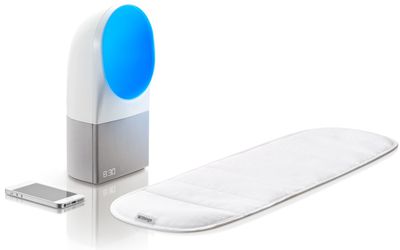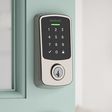Withings, the company behind the Smart Activity Tracker and the Smart Body Analyzer is showing off its newest health monitoring device, the Aura Smart Sleep System. Aura, which consists of a bedside device with an ambient light, a sleep sensor, and an app, is designed to monitor and improve the sleeping experience.
The system's bedside device records information like noise pollution, room temperature, and light level, while the sleep sensor, which goes under a mattress, monitors sleep patterns, breathing cycles, and heart rate. The sensor is able to pick up the tiniest of movements, even under thick mattresses.

Withings Aura is comprised of a soft and discreet sleep sensor that slips under your mattress and works in synchronization with the sensitively designed bedside device. Together, the two units record and monitor an array of factors to offer you a deep understanding of your sleeping experience. The sleep sensor focuses on personal patterns (body movements, breathing cycles and heart rate) and the bedside device screens your bedroom environment (noise pollution, room temperature and light levels).
In addition to recording information, the bedside device is able to offer customized light and sound to improve sleep, along with alarm clock functionality and personalized wake-up and fall-asleep programs.
For example, the multi-color LED in the bedside device is able to regulate melatonin, and sound programs are able to replicate the frequency and pattern of the circadian rhythm to stimulate users upon waking and relax them when sleeping.
The accompanying app allows users to visualize and compare their sleep cycles from night to night, monitoring triggers that cause poor sleep, and it also allows user to program their individual sleep programs.
Withings' Aura sleep system will be available in the spring of 2014 for $299.
























Top Rated Comments
Sadly not. This does nothing to offer respitory aid only ambience. Personally I already know my sleeps crap, this is just an expensive way of telling you.
Why would you state that this "can't help"? Even if the monitoring only allows a person with sleep apnea to become aware that they have the problem, it might encourage them to seek more corrective help. By providing that guidance, this device could "help" them. It does have a "sensor".
(I have no stake in this, but I find your comment too closed-ended/minded. Many who suffer from sleep apnea are not aware that they suffer it.)